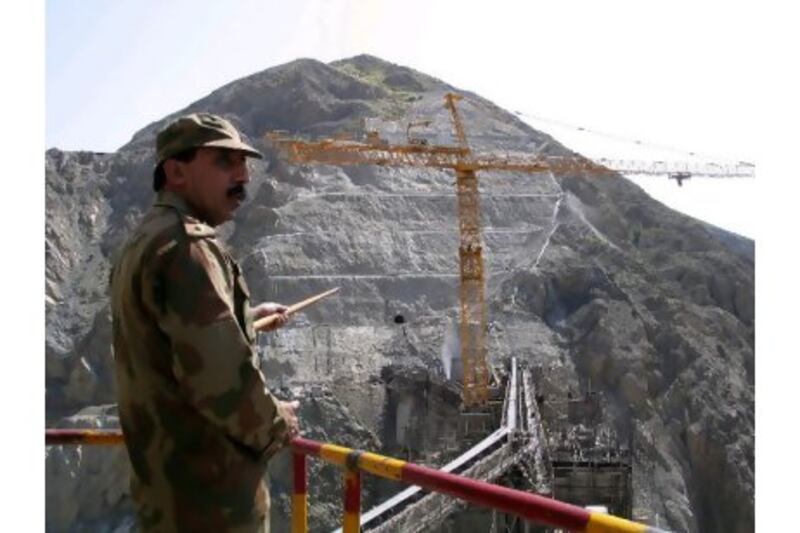ISLAMABAD // Tribesmen in the South Waziristan region of Pakistan are celebrating the completion of fortune-turning development projects made possible by a 2006 peace deal between the government and local militants.
New farms have sprung up in previously barren areas to the east of Wana, the region's only town, and Ahmedzai clan members of the Wazir tribe are on the verge of harvesting their first wheat crop.
"This will completely change our lives," said a tribesman from the village of Dargai, where a new "small" dam started operations in late 2010.
"For the first time, we would have a stable source of food and income from selling produce."
A "major" dam on the Zhob River, dubbed the Gomalzai Dam, was completed in March and is currently being filled.
It would serve as the major irrigation source for the plains of South Waziristan, where resident farmers are largely dependent on the region's relatively high rainfall.
The Dargai dam is part of a series of small dams, designed to capture and store rainwater flowing down adjacent mountains, rather than dam a flowing river.
Nespak, a Pakistan state engineering firm, is building others at Nahar, Zalai and Dhana.
The construction of the Dargai dam was possible because of the "enthusiasm for development" of the leading Wazir tribal Taliban commander, Maulvi Nazir, residents and intelligence sources said.
Residents said fighters loyal to Mr Wazir had provided security to Nespak engineers and labourers while they worked on the Dargai dam.
Mr Nazir is the regional chief of the Haqqani Network, an Afghan militant faction with close ties to Al Qaeda that US officials have repeatedly described as a bigger security threat in Afghanistan than the Taliban.He fought Pakistani security forces between 2003 and 2006, before agreeing to expel foreign Al Qaeda militants from his territory under the terms of a September 2006 peace agreement between the Pakistani government and the Wazir tribe.
The agreement was brokered in part by the Haqqani Network chief, Jalal-ud-Din Haqqani, who was photographed at the signing ceremony. The images, released at the time by the military's Inter Services Public Relations directorate, showed him standing in a group that included the army commander for north-western Pakistan, Gen Ali Jan Orakzai.
The truce with Maulvi Nazir enabled Pakistani security forces to launch a massive 2009 counterterrorist operation against the Tehrik-i-Taliban Pakistan (TTP) insurgents in areas of South Waziristan dominated by the Mehsud tribe.
The Mehsud and Wazir tribes have been bitter rivals for centuries. The operation displaced tens of thousands of South Waziristan tribesmen.
Their hardship was multiplied by a power blackout imposed on the region, which rendered useless electric pumps used to tap aquifers about 60 to 70 metres underground for crop irrigation.
Like the six other components of the so-called Fata tribal regions of Pakistan, South Waziristan is desperately undeveloped both socially and economically.
Power supplies are intermittent, schools and health care clinics are barely functional, and there is no cross-border commerce with Afghanistan.
The May 2 killing of Osama bin Laden in the Pakistani hill resort of Abbottabad tested the 2006 peace agreement, which covered South Waziristan and neighbouring North Waziristan. Fears of a backlash arose when suspected militants fired four rocket-propelled grenades at a paramilitary fort in Wana on May 3.
The attack caused no casualties or damage to the fort, but prompted the region's administrator to summon a meeting of a tribal council, or jirga, the next day.
Under a system of governance introduced by British colonialists in the 19th century, the tribes of the Fata have governed themselves through traditional, consensus-seeking councils, which interact with government administrators known as political agents.
Intelligence sources said the meeting was poorly attended, so the dozen elders that did turn up had to remind their fellow elders, including Maulvi Nazir, that a violation of the 2006 peace agreement would result in a collective punishment of the Ahmedzai Wazir tribe.
However, residents said there was no noticeable tension in the area.
The regional administrator allowed tribesmen to vent their anger at bin Laden's killing at a demonstration in Wana on May 9.
Rivals of Mr Nazir, previously expelled by him for hosting foreign Al Qaeda militants, are suspected of mounting the attack on the paramilitary fort, the intelligence sources said. Residents said they foresaw no possibility of a resumption of a militant insurgency in the Wazir tribal areas of South Waziristan.
"Nazir has not lifted a gun in two years. He is a cool-headed, wise man and is very pleased about the development projects," said a Wana resident.
Like other Wazir tribesmen, he is particularly happy about the construction of a new road between Wana and Dera Ismail Khan that bypasses Mehsud tribal territory.
The Frontier Works Organisation, an engineering arm of the Pakistani army, built the road.
[ foreign.desk@thenational.ae ]
* Ehsanullah Wazir reported from Dera Ismail Khan






